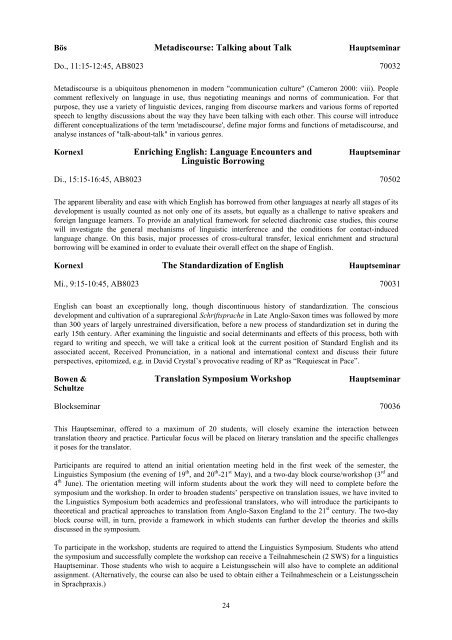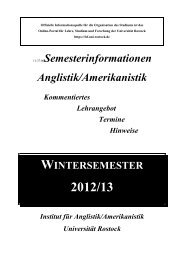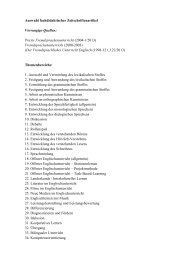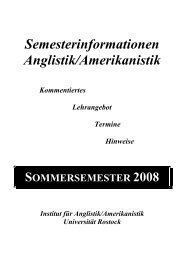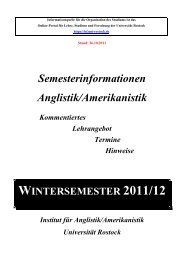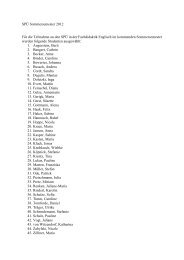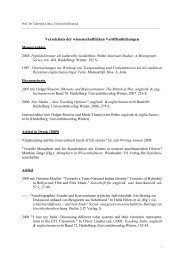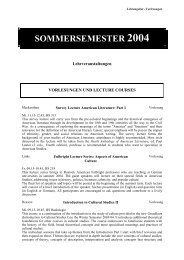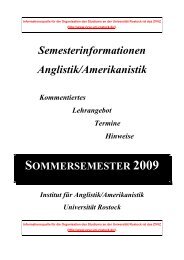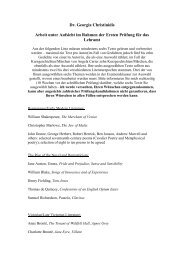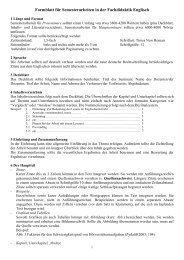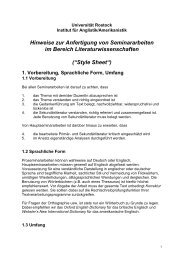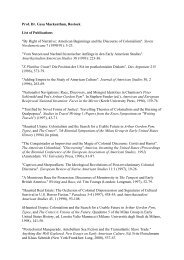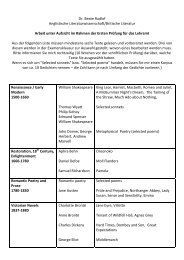Semesterinformationen Anglistik/Amerikanistik - Institut für Anglistik ...
Semesterinformationen Anglistik/Amerikanistik - Institut für Anglistik ...
Semesterinformationen Anglistik/Amerikanistik - Institut für Anglistik ...
Create successful ePaper yourself
Turn your PDF publications into a flip-book with our unique Google optimized e-Paper software.
Bös Metadiscourse: Talking about Talk Hauptseminar<br />
Do., 11:15-12:45, AB8023 70032<br />
Metadiscourse is a ubiquitous phenomenon in modern "communication culture" (Cameron 2000: viii). People<br />
comment reflexively on language in use, thus negotiating meanings and norms of communication. For that<br />
purpose, they use a variety of linguistic devices, ranging from discourse markers and various forms of reported<br />
speech to lengthy discussions about the way they have been talking with each other. This course will introduce<br />
different conceptualizations of the term 'metadiscourse', define major forms and functions of metadiscourse, and<br />
analyse instances of "talk-about-talk" in various genres.<br />
Kornexl<br />
Enriching English: Language Encounters and<br />
Linguistic Borrowing<br />
Hauptseminar<br />
Di., 15:15-16:45, AB8023 70502<br />
The apparent liberality and ease with which English has borrowed from other languages at nearly all stages of its<br />
development is usually counted as not only one of its assets, but equally as a challenge to native speakers and<br />
foreign language learners. To provide an analytical framework for selected diachronic case studies, this course<br />
will investigate the general mechanisms of linguistic interference and the conditions for contact-induced<br />
language change. On this basis, major processes of cross-cultural transfer, lexical enrichment and structural<br />
borrowing will be examined in order to evaluate their overall effect on the shape of English.<br />
Kornexl The Standardization of English Hauptseminar<br />
Mi., 9:15-10:45, AB8023 70031<br />
English can boast an exceptionally long, though discontinuous history of standardization. The conscious<br />
development and cultivation of a supraregional Schriftsprache in Late Anglo-Saxon times was followed by more<br />
than 300 years of largely unrestrained diversification, before a new process of standardization set in during the<br />
early 15th century. After examining the linguistic and social determinants and effects of this process, both with<br />
regard to writing and speech, we will take a critical look at the current position of Standard English and its<br />
associated accent, Received Pronunciation, in a national and international context and discuss their future<br />
perspectives, epitomized, e.g. in David Crystal’s provocative reading of RP as “Requiescat in Pace”.<br />
Bowen &<br />
Schultze<br />
Translation Symposium Workshop<br />
Hauptseminar<br />
Blockseminar 70036<br />
This Hauptseminar, offered to a maximum of 20 students, will closely examine the interaction between<br />
translation theory and practice. Particular focus will be placed on literary translation and the specific challenges<br />
it poses for the translator.<br />
Participants are required to attend an initial orientation meeting held in the first week of the semester, the<br />
Linguistics Symposium (the evening of 19 th , and 20 th -21 st May), and a two-day block course/workshop (3 rd and<br />
4 th June). The orientation meeting will inform students about the work they will need to complete before the<br />
symposium and the workshop. In order to broaden students’ perspective on translation issues, we have invited to<br />
the Linguistics Symposium both academics and professional translators, who will introduce the participants to<br />
theoretical and practical approaches to translation from Anglo-Saxon England to the 21 st century. The two-day<br />
block course will, in turn, provide a framework in which students can further develop the theories and skills<br />
discussed in the symposium.<br />
To participate in the workshop, students are required to attend the Linguistics Symposium. Students who attend<br />
the symposium and successfully complete the workshop can receive a Teilnahmeschein (2 SWS) for a linguistics<br />
Hauptseminar. Those students who wish to acquire a Leistungsschein will also have to complete an additional<br />
assignment. (Alternatively, the course can also be used to obtain either a Teilnahmeschein or a Leistungsschein<br />
in Sprachpraxis.)<br />
24


